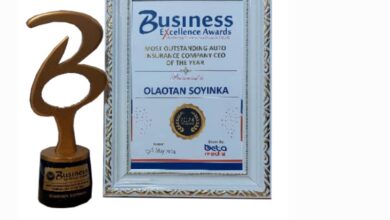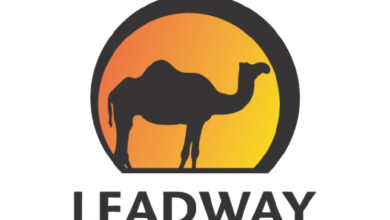AIO President Implores African Insurers To Be Proactive

The President of the African Insurance Organization (AIO), Mr. Tope
Smart has called on insurance operators in Africa to be more proactive
in their approach to business and move away from old ways of doing
things to build a trusted industry that guarantees a brighter future.
Smart made the call in his keynote address on the occasion of the 50th
anniversary celebration of the African Insurance Organisation at the
ongoing 48th AIO Conference and General Assembly in Nairobi, Kenya
yesterday.
He reminded the AIO leaders of their responsibilities of leading the
action that will engender the growth of the industry.
Speaking on the topic ‘’AIO At 50: A Call For African Insurance
Renaissance,’’ Smart who is also the Group Managing Director, NEM
Insurance Plc, Nigeria, said ‘’there is a vital responsibility on the
shoulders of the AIO to lead the action towards a synergized African
insurance industry, working towards standardization and harmonization
within the African insurance industry.
‘’We have the lessons of the past to guide us and there is no better
time to start than NOW, right here, as we discuss the renaissance of
the African insurance industry.
‘’The Covid-19 pandemic caught many of us unprepared with regards to
digitalization and innovation; we need to be more proactive and move
away from our old ways which are no longer relevant and move towards
insurance which people can trust, insurance which is tailored towards
the needs of customers, insurance that is affordable, insurance that
is accessible and relevant to the problems of today.
Smart said in spite of everything, the industry has remained resilient.
‘’There have been good days and there have been challenges but the
industry has proven to be resilient and if we are here today, it is
because we believe that the future will be brighter.’’
Below is full text of the Keynote Address
KEYNOTE ON THE AIO AT 50: A CALL FOR AFRICAN INSURANCE RENAISSANCE,
PRESENTED BY MR. TOPE SMART, PRESIDENT OF THE AIO AND GROUP MANAGING
DIRECTOR OF NEM INSURANCE PLC, NIGERIA, ON THE OCCASION OF THE 50TH
ANNIVERSARY CELEBRATION OF THE AFRICAN INSURANCE ORGANISATION.
AIO Executive Committee members,
Distinguished panellists,
Ladies and gentlemen,
I am greatly honoured by this opportunity given to my humble self, to
deliver this keynote on the occasion of the 50th anniversary
celebration of Africa’s insurance torchbearer, the African Insurance
Organisation.
The theme of this discussion for which I am delivering a keynote is
THE AIO AT 50: A CALL FOR AFRICAN INSURANCE RENAISSANCE.
Before we discuss the substance of the subject, I will like us to be
on the same wavelength with the major concepts imbedded in this theme.
Permit me limit my concept definition to one keyword, RENAISSANCE,
for time constraints, and I also wish to work with the assumption that
the other words are easily understood.
Simply put, renaissance can mean re-birth or a revival of or renewed
interest in something. There are hundreds of concepts around this
word, Renaissance.
For example, renaissance has been defined as the activity, spirit, or
time of the great revival of art, literature, and learning in Europe
beginning in the 14th century and extending to the 17th century,
marking the transition from the medieval to the modern world.
I won’t want to enter all those scientific concepts and controversies
surrounding the word so let’s limit ourselves at Renaissance to mean
rebirth, revival, renewed interest or transition.
When we talk about rebirth, it means something was born earlier and
has been existing, and due to some factors, went dormant. Revival
equally signifies that something has been living but at some point,
witnessed a slowdown in steam.
Let me begin by attempting a look at the past 50 years of the African
insurance industry within the context of the birth of the AIO, before
making some projections into the future.
1. 50 YEARS PREVIEW.
1.1 Insurance penetration in Africa: Awareness, reputation building,
barriers, and tools
The African insurance industry remains one of the least penetrated in
the world, with significant scope for growth. In this respect,
Africa’s average insurance penetration remains comparatively low at
around 2% in 2020, measuring well below the global average of around
7%. The insurance penetration rate in Africa is mainly a function of
average national incomes and the extent to which compulsory insurance
regulation is enforced in various sectors. These primary drivers feed
into the level of insurance awareness.
The continent’s low average insurance penetration over the past 50
years rate is largely attributed to:
• lack of awareness on available insurance products,
• low-income levels among the key consuming public,
• perceived low rate of returns for life policies,
• cumbersome claim settlement procedures,
• lack of trust of insurance players,
• inappropriate pricing and risk profiling,
• poor product-market fit,
• inadequate distribution channels and
• expensive premiums.
1.2 Insurance Regulation and Supervision in Africa: The past 50 years
Insurance supervisors in Africa have historically focussed mostly on
prudential soundness (Beyers, Chiew, Gray & Hougaard, 2020). As such,
the reporting and measurement frameworks for prudential oversight are
well established. However, most regulatory mandates have been evolving
and progressing, with a broadening focus on conduct of business,
treating customers fairly, inclusive insurance and proactive
development of the insurance industry (Beyers, Chiew, Gray & Hougaard,
2020). There is now also a greater recognition of the link between
insurance and broader policy challenges- inclusive economic
development, climate risk and digitalisation. This broader focus calls
for measurement of a broader suite of indicators and places additional
data gathering, and analysis requirements on insurance regulatory
authorities (Beyers, Chiew, Gray & Hougaard, 2020). As such, several
governments have been coming on board to assist in the development of
the insurance industry.
Some African insurance supervisors have gradually been moving from
compliance-based to risk-based supervision to ensure the financial
sustainability of the industry in line with global trends. Many
insurance regulators are revising their Insurance Acts to incorporate
best practices, such as risk-based supervision, treating your customer
fairly (“TCF”) procedures, and many other prudential rules to increase
the protection of policyholders. In this regard, there are a few
regulatory authorities that have implemented a Solvency II framework,
albeit it with varying levels of simplifications. South Africa, Kenya,
Rwanda, Uganda, Mauritius, and Morocco adopted Solvency II frameworks,
leading the pack across the continent. Namibia is on course towards
adopting a risk-based solvency framework, with the draft model having
been presented to the market for comments. Zimbabwe is undertaking a
parallel run of the Zimbabwe Integrated Capital and Risk Programme
(“ZiCARP”) (Insurance and Pension Commission Zimbabwe, 2021). Other
jurisdictions, such as Malawi, Zambia, Tanzania are in the early
stages of developing a risk-based solvency model, although the current
frameworks have comprehensive modules in measuring admissible assets
against liabilities that consider a wide, but not so comprehensive,
range of risks.
On the other hand, Western Africa, including the CIMA zone, Nigeria
and Ghana, opted for higher absolute minimum capital requirements
commencing from 2020, in addition to existing simple risk-based models
that compare net admissible assets against liabilities, particularly
in the CIMA zone. In most instances, the minimum capital requirements
increased between USD8m and USD10m for primary insurers, while for
reinsurers the capital requirements increased significantly by between
USD15m and USD25m (AIG, 2018). The concept of the CIMA zone regulatory
authority is viewed as co-operative, unifying and harmonious, while
simplifying regulation and supervision.
1.3 Insurance rating in Africa: Strengths and Weaknesses
Financial strength ratings provide an opinion of an entity’s ability
to meet its financial commitments to its policyholders. Financial
strength ratings are provided by credit rating agencies such as
Standard & Poor’s (“S&P”), Fitch, Moody’s and AM. Best.
There has been a growing number of insurance companies obtaining
credit ratings over the last decade, given the widening acceptance and
importance of ratings across the continent. In this respect, the major
importance of insurance ratings include:
• Assisting insurance buyers and brokers with easy selection based on
independent opinions when buying insurance covers.
• Helping management and directors in assessing the performance of
their companies over time and against peers in the market.
• Instilling discipline and embedding best practice in the management
of insurance companies.
• Less sophisticated users of ratings derive some level of confidence
from the simplistic measures.
• Assisting in the development of capital markets.
On the other hand, the main weaknesses of insurance ratings are:
• On an internal scale basis, there is little credit differentiation,
given the low sovereign ratings across the continent.
• Many African countries are in default and international ratings will
not help the companies in those jurisdictions, as ratings are derived
from the country risk of its jurisdiction.
• International companies are likely to get higher ratings and thus
sizeable mandates than local companies, frustrating efforts of
localizing profits and development.
1.4 Insurance Training and Capacity Building: Sufficient or lacking?
According to the United Nations (2022), capacity-building is defined
as the process of developing and strengthening the skills, instincts,
abilities, processes, and resources that organizations and communities
need to survive, adapt, and thrive in a fast-changing world. An
essential ingredient in capacity-building is transformation that is
generated and sustained over time from within; transformation of this
kind goes beyond performing tasks to changing mindsets and attitudes
(United Nations, 2022). Due to the technical nature of insurance and
the importance of experience, skill and product knowledge, as well as
the potential role of the sector in economic development, investing in
capacity building has become very critical.
Most products offered in Africa are still largely influenced by
European standards. Furthermore, the solvency regimes are still
derived from European models, given the lack of mortality tables that
are African derived, excluding Kenya, South Africa, Uganda and more
recently Zimbabwe.
In light of the rapid changes in technology, shifting labour market
demographics, higher customer expectations, growing competitive
dynamics, turbulent in operating environments, are the programmes and
training requirements evolving at a pace to address these issues?
1.5 Transfer of knowledge on Insurance from generation to generation
(Leadership)
Historically, there was a huge gap in knowledge transfer
intergenerationally. However, as organizations are progressing, there
is rising awareness of the need to transfer knowledge from generation
to generation. In this respect, some organizations are implementing
mentoring programmes aimed at passing knowledge and training future
generations for success.
1.6 Political and economic stability in Africa: Effects and role of
the insurance industry
Political stability is very important, especially for developing
countries. According to Dalyop (2019), the relationship between
political instability and economic growth flows in either direction,
with high political instability resulting in low economic growth, and
low economic growth resulting in political instability. The political
landscape is a factor that is used to determine the institutional
landscape of a jurisdiction. In this regard, the institutional
assessment is based on how political risk, regulatory quality,
government effectiveness, governance factors and the business
environment, which render an economy more or less likely to absorb
shocks. Most countries in Africa have weak institutional scores, given
high political risks, governance challenges, comparatively high levels
of corruption and somewhat low accountability.
Over the last decade, some African countries have experience
political and economic stability, which resulted in increased
productivity and investor confidence. This subsequently cascaded into
the development of the insurance industry. Meanwhile, some other
countries were characterized by comparatively high political
instability, resulting in volatile economic development.
1.7 Growth of the African insurance industry: Premium flight and
Utmost Good Faith.
Growth opportunities in the African continent remain high, largely
driven by a young and growing population with increasing utilization
of technology. Despite the additional pressures of unrelenting
regulatory and insurance accounting changes, and the huge costs
associated with the changes, there are also some positive developments
and opportunities for growth. The younger generation is looking for
new ways to connect and protect, bringing affordability and access to
the continent. These market conditions and dynamics are likely to
continue to give rise to Insurtechs who, through technological
innovation, are able to tackle consumer awareness and resistance and
address inefficiencies within the financial system for product
development, distribution, and settlement.
2 . A PROJECTION INTO THE FUTURE
Having looked at what the African insurance industry looked like
yesterday, permit me share with you, what we think the industry should
look like in the next 50 years. The areas we need to lay emphasis on
for a better, more vibrant insurance industry. The list is not
exhaustive and I’m sure the imminent panelists here will enlighten us
more.
The insurance sector can play a crucial role in financial and
economic development. By reducing uncertainty and limiting the adverse
effects of large losses, the sector can encourage new investments,
innovation, and competition.
2.1 Technology, Innovation and Data
The insurance industry in Africa is undergoing a period of
significant change and disruption. It is now evident that technology
is playing a major role in this, with new companies and business
models emerging that are challenging the existing ones. The
technological advancements in information management tools and
mobility have paved the way for a new era in the African insurance
industry.
Consumer behavior is ever changing, and this constantly puts pressure
on insurers to adapt and innovate if they are to stay relevant.
Nonetheless, the future looks bright for the African insurance
industry, and it will be fascinating to see how it develops over the
coming years. One way, amongst many others, in which technology is
shaking up the status-quo is through the use of Blockchain. This
distributed ledger technology has the potential to provide a more
robust and efficient infrastructure for the industry, improving
transparency and reducing costs.
2.2 Education and Training
There is an existing gap between academia and the professional world
which needs to be bridged. There are many questions regarding
education and training in the African insurance industry, which need
to be addressed.
Given the changing needs of learners towards more flexible training
regimes, coupled with the need to improve the quality of insurance
education in Africa and make it Africa relevant, there is the need for
changes to insurance training and capacity building systems in Africa.
This underscores the need for collaboration among the various
insurance training institutions across Africa towards standardization
of insurance training in the continent.
The African Insurance Organisation is therefore called upon to play
its role as the center of excellence for insurance in Africa. As key
stakeholders focus on relevant training and capacity building, there
will be an increase in productivity, enhanced core competencies,
better skills and job performance, increased employee motivation,
ownership and confidence, and greater innovation and development.
2.3 The role of AIO in Insurance integration in AfCFTA
One of the main objectives of the AfCFTA is to create one African
market, by eliminating non-tariff trade barriers.
Insurance is an enabler of trade; Insurers are the risk managers and
financial risks shock absorbers. Therefore, to take advantage of the
AfCFTA the following levels of integration will be crucial in the
African insurance industry:
– Harmonization of insurance laws and regulations
– Harmonization of tax regimes
– Harmonization of insurance education and training standards
– Claims management agreements
The removal of trade barriers under the AfCFTA, will further enhance
the need for standardization and harmonization in the African
Insurance Industry.
With the expectation of fully implementing the African Continent Free
Trade Agreement (“AfCFTA”), there is likely to be a rise in the
requirement for insurance companies to have independent assessments of
their credit profiles to facilitate free flow of trade.
2.4 Integration of the Younger Generation of Insurance Professionals
There must be an early integration of the younger generation of
insurance professionals as a way of managing a seamless transition and
bridging the succession gap which is presently inherent in the African
Insurance Industry. Transferring knowledge from generation to
generation provides support, helps develop careers and assists in
achieving tangible results. Note is also taken of the benefits that
the mentors receive from transferring knowledge such a learning
experience, improving leadership skills, as well as leaving a legacy.
Given the importance of intergenerational knowledge transfer, leaders
must be committed to investing in the younger generations.
According to Insurance Business America, one of the biggest changes
the younger employees are bringing to the insurance industry is a
focus on customer experience.
3. CONCLUSION
In conclusion, I now leave the responsibility to the Chairman and
panelists to give us more insights on this topic THE AIO AT 50: A CALL
FOR AFRICAN INSURANCE RENAISSANCE.
Thank you all for your kind and keen attention.





